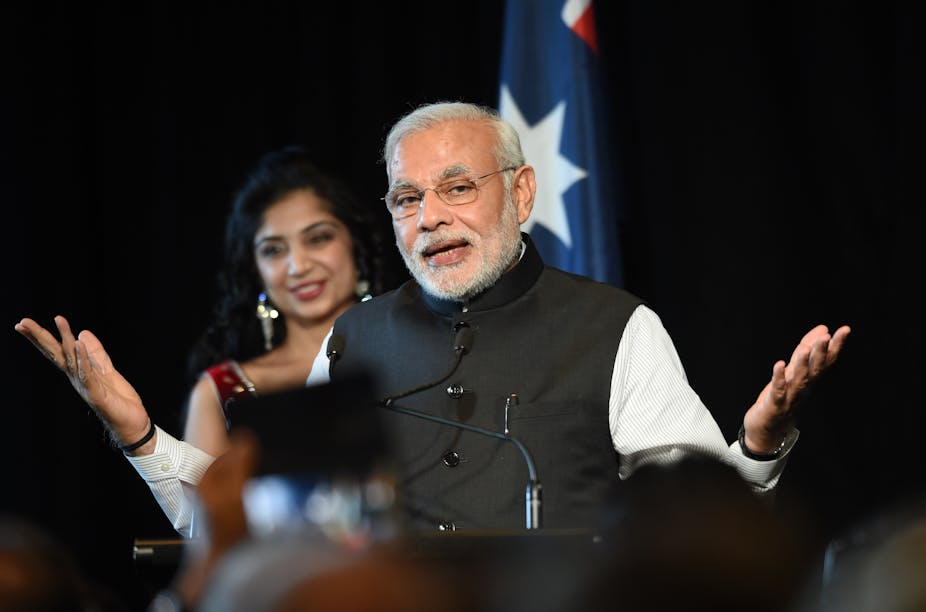Behind the flag-waving and cheers surrounding Indian Prime Minister Narendra Modi’s recent visit to Australia are serious questions about the safety and security implications of Australia’s agreement to supply uranium to New Delhi.
When he inked the uranium deal in India in September, Tony Abbott praised India’s “absolutely impeccable non-proliferation record”. He refused to answer questions about alleged serious deficiencies in India’s civil nuclear sector and was reduced to white-flannelled cliché, declaring that Australia and India trust each other on issues like uranium safeguards because of “the fundamentally ethical principle that every cricketer is supposed to assimilate – play by the rules and accept the umpire’s decision”.
Yet despite the assurances of peaceful purposes, this deal has serious nuclear security implications. After all, India has form. It used Canadian peaceful nuclear technology to develop weapons, provoking Pakistan to follow suit. Even if all goes well – and in the aftermath of the Fukushima disaster that is a big assumption – Australian sales could potentially free up India’s domestic uranium stocks for military use.
Whatever happens, the new deal certainly won’t reduce the continuing tension with nuclear rival Pakistan, or promote nuclear non-proliferation.
Checks and balances
India is a nuclear-armed nation that has not signed the Nuclear Non-Proliferation Treaty, and as such is not subject to the (admittedly fragile) checks and balances provided by full international nuclear safeguards. It is engaged in an active nuclear weapons program, has an estimated 80-100 nuclear warheads, and explicitly refuses to renounce nuclear testing.
Contrary to Abbott’s statement, India is neither playing by the rules nor recognising the authority of the international umpire. Add these facts together and the plan to sell Australian uranium to India is in clear and direct conflict with Australia’s international obligations under the South Pacific Nuclear Weapons Free Zone Treaty, which says:
States Parties are obliged not to manufacture or otherwise acquire, possess, or have control over any nuclear explosive device anywhere inside or outside the Treaty zone; not to seek or receive any assistance in this; not to take any action to assist or encourage the manufacture or acquisition of any nuclear explosive device by any State; and not to provide sources or special fissionable materials or equipment to any non-nuclear weapon State (NNWS), or any nuclear weapon State (NWS) unless it is subject to safeguards agreements with the (International Atomic Energy Agency) IAEA.
Prime Minister Modi is intent on expanding India’s civil and military nuclear ambitions but there are big question marks around the safety and security arrangements for India’s nuclear sector. In 2012 a scathing report by India’s then Auditor-General Vinod Rai warned of a “Fukushima or Chernobyl-like disaster if the nuclear safety issue is not addressed”.
The issues identified in this frank assessment from one of India’s own senior officials have not been addressed, and there is no guarantee that they ever will be. The safety of India’s nuclear reactors remains shaky, because the sector’s regulation and governance is deficient. As we have seen with Fukushima and Chernobyl, the cost of errors or accidents can be catastrophic.
Australian uranium’s role
Fukushima is a continuing nuclear crisis that has been directly fuelled by Australian uranium, so its lessons are significant. If Japan, the world’s third-largest economy and a nation steeped in technological expertise, could not control the atomic genie, it bodes poorly for the application of this technology in other countries. In the aftermath of Fukushima, instead of opening up uranium exports to insecure and conflict-prone regions, we should tread more carefully.
With Australia’s renewable energy expertise and resources, we are perfectly placed to turn on the lights in Indian villages while ensuring that the Geiger counter stays off.
The deal has even prompted doubts among pro-nuclear commentators. For two decades until 2010, John Carlson was director general of the Australian Safeguards and Non-Proliferation Office and charged with overseeing Australian uranium sales. Now he has raised serious concerns, including his worry that Australia may be unable to keep track of what happens to uranium once it’s sold to India.
As Carlson makes clear, without proper reporting Australia has no way of knowing whether India is really meeting its obligations to identify and account for all the material that is subject to the agreement, and to apply Australia’s safeguard standards. It is not good enough simply to take India on trust as a fellow cricket-mad nation, or to appeal to an “impeccable” non-proliferation record that it doesn’t actually have.
Carlson’s assessment is that the planned deal is short-sighted, self-defeating, and compromises Australia’s standards. That warning should ring loud alarms in Canberra. The deal has yet to be examined by the Joint Standing Committee on Treaties, which is taking public comments on the planned deal until November 28. The rigour that the committee brings to this issue will be a test of whether radioactive rhetoric or real-world responsibility is in the ascendency in Canberra.
Uranium is not just another mineral. It fuels nuclear reactors and devastating weapons. Whether used for electricity or bombs, it inevitably produces radioactive waste that must be stored for geological timescales.
As home to around a third of the world’s uranium supply, Australia’s decisions on this issue matter. It is important that those flagging concerns are listened to just as much as those waving flags.

